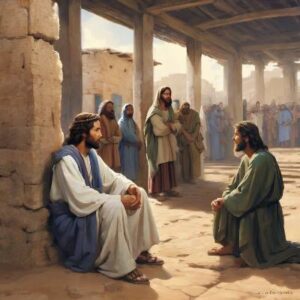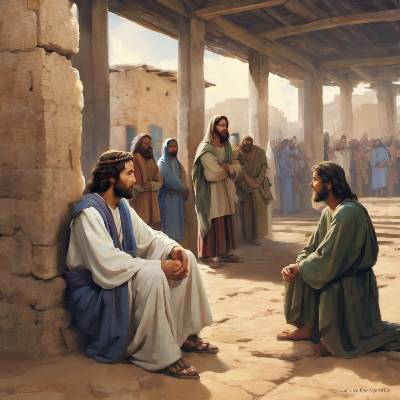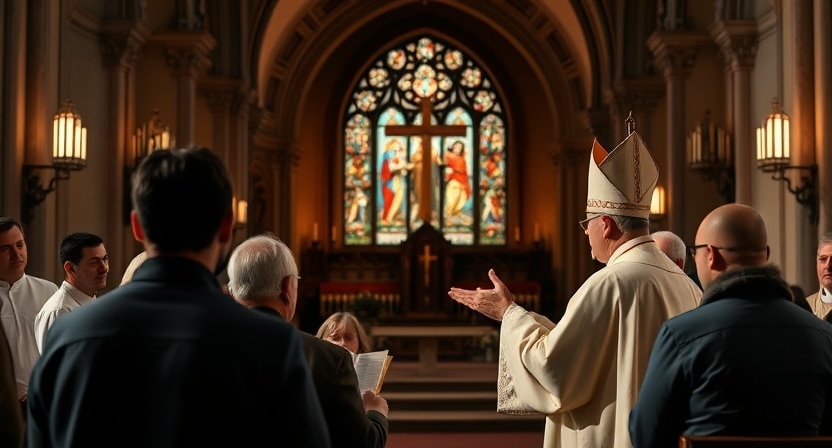TENTH SUNDAY OF THE YEAR
The friend of sinners
INTRODUCTION AND CONFITEOR
Today we have the extraordinary scene of Jesus eating and drinking with sinners and outcasts.
We are gathered around the table of Christ, not because we think we are better or more deserving than others, but because we know we are sinners, sinners who need his healing and forgiveness. [Pause]
Lord, you came to heal the broken- hearted. Lord, have mercy.
You came to call sinners to repentance. Christ, have mercy.
You came to seek out and to save those who are lost. Lord, have mercy.
HEADING FOR READING
First Reading (Hosea 6: 3-6). what God wants from his people is not their sacrifices, but their love, a love that is genuine and which doesn’t disappear with the morning dew.
Second Reading (Romans 4: 18-25). Abraham’s faith in God should serve as a model for our faith in Christ.
Gospel (Matthew 9:9-13). Jesus shocks the religious leaders by eating and drinking with sinners, and calling one of them to be an apostle.
1st Reading – Hosea 6:3-6
3 Let us know, let us strive to know the Lord; as certain as the dawn is his coming. He will come to us like the rain, like spring rain that waters the earth.”
4 What can I do with you, Ephraim? What can I do with you, Judah? Your loyalty is like morning mist, like the dew that disappears early.

5 For this reason I struck them down through the prophets, I killed them by the words of my mouth; my judgment shines forth like the light.
6 For it is loyalty that I desire, not sacrifice, and knowledge of God rather than burnt offerings.
Responsorial Psalm – Psalms 50:1, 8, 12-13, 14-15
R. To one whose way is blameless, I will show the salvation of God.
1 The God of gods, the Lord,
has spoken and summoned the earth
from the rising of the sun to its setting.
8 Not for your sacrifices do I rebuke you,
your burnt offerings are always before me.
R. To one whose way is blameless, I will show the salvation of God.
12 Were I hungry, I would not tell you,
for mine is the world and all that fills it.
13 Do I eat the flesh of bulls
or drink the blood of he-goats?
R. To one whose way is blameless, I will show the salvation of God.
14 Offer praise as your sacrifice to God;
fulfill your vows to the Most High.
15 Then call on me on the day of distress;
I will rescue you, and you shall honor me.”
R. To one whose way is blameless, I will show the salvation of God.
2nd Reading – Romans 4:18-25
18 He believed, hoping against hope, that he would become “the father of many nations,” according to what was said, “Thus shall your descendants be.”
19 He did not weaken in faith when he considered his own body as [already] dead (for he was almost a hundred years old) and the dead womb of Sarah.
20 He did not doubt God’s promise in unbelief; rather, he was empowered by faith and gave glory to God
21 and was fully convinced that what he had promised he was also able to do.
22 That is why “it was credited to him as righteousness.”
23 But it was not for him alone that it was written that “it was credited to him”;
24 it was also for us, to whom it will be credited, who believe in the one who raised Jesus our Lord from the dead,
25 who was handed over for our transgressions and was raised for our justification.
Alleluia – Luke 4:18
R. Alleluia, alleluia.
18 The Lord has sent me to preach Good News to the poor, to proclaim release to the captives
R. Alleluia, alleluia.
Gospel – Matthew 9:9-13
9 At that time: Jesus passed on from there, he saw a man named Matthew sitting at the customs post. He said to him, “Follow me.” And he got up and followed him.
10 While he was at table in his house, many tax collectors and sinners came and sat with Jesus and his disciples.
11 The Pharisees saw this and said to his disciples, “Why does your teacher eat with tax collectors and sinners?”
12 He heard this and said, “Those who are well do not need a physician, but the sick do.
13 Go and learn the meaning of the words, ‘I desire mercy, not sacrifice.’ I did not come to call the righteous but sinners.”
HOMILY
One of the dangers facing religious people is that of self – righteousness. You get people who are scrupulous in observing the external duties of their religion, and who thereby believe they are acceptable to God and therefore entitled to look down on others. This was the chief fault of the Scribes and Pharisees. Austere, grim, earnest men, they justified themselves by the practice of severe virtues while condemning others who did not come up to their standards.
It is terrible to find anyone, but especially so-called religious people, devoid of the chief human attributes – love and pity for others. Such people are like a fruitcake which contains all the necessary ingredients except the most important one of all – yeast. In the case of the Scribes and Pharisees, the yeast of human kindness, compassion, and love was missing. Here is an example of a man who got it right.
All the desert monks looked on Abbot Anastasius as a saint. Yet one day, when a monk by the name of James sinned and was told to leave the community, Anastasius got up and walked out with him, saying: ‘I too am a sinner.’ James, however, did not reform and fell very low.
Years later he came to visit Anastssius. He found him immersed in his evening prayer. ‘Oh, forgive me for interrupting your prayer and making you break your Rule,’ James said. But Anastasius replied: ‘Don’t worry. My Rule is to receive you with hospitality.’ And he gave him food and lodgings for the night.
Now Anastisius had a Bible made of fine parchment which was worth quiet a bit of money. Seeing the book, James made off with it when he was leaving the following morning. When Anastisius realized that James had stolen his precious book he made no effort to follow him, fearing that he might only make him add the sin of perjury to that of theft. James went to a nearby merchant to sell the book. He asked a high price.
The merchant said: ‘Give me the book for a little while so that I can find out whether it is worth that much.’ With that he took it to Anastisius. Anastisius took one look at it and said: ‘Yes this a splendid book. In fact it is worth much more.’ The buyer came back and told the thief what Anastisius had said. He asked: ‘Was that all he said? Did he make no other remarks?’ ‘No,’ said the merchant, ‘he didn’t say another word.’
On hearing this, James was deeply moved, and said: ‘I’ve changed my mind. I don’t want to sell the book after all’. And he hastened back to Anastasius and, with tears in his eyes, gave him back the book and begged him to forgive him. Anastasius received him with the same kindness and hospitality as before. He simply said: ‘I forgive you. Keep the book. Read a little from it each day, and pray to Christwho received sinners like us and brought them back to God’s love and friendship. Now go in peace’.
His fellow monks were surprised to see him wasting his time on people such as James, but he said: ‘Tell me, if your robe is torn, will you throw it away?’ And they replied: “No, we will mend it and put it back on’. Then he said: ‘If you take such care of your robe, will not God be merciful to one who bears his image?’
And the kindness of Anastasius paid off. James took his advice and changes his life. He returned to the life of a monk and became known for his goodness and holiness.
Here we have a splendid example. Here was a man who modeled himself on Christ. Even though he was undoubtedly a very holy man, he did not thereby think he had a right to judge or reject others. In fact, he realized that he was thereby called to help them. He placed kindness, mercy, and hospitality towards fellow human beings, especially erring ones, far above the practice of penances and the duties of his Rule. He realized that love is the sacrifice God asks from us – to love everyone, even those who are least lovable.
To return to the Gospel. The amazing thing is this: Christ found more genuine goodness and openness among the rejects than among the religious people. Unlike people who are inexperienced in loving, he wasn’t put off by the exterior. He was able to see goodness in down-and-outs and sinners, and succeeded in awakening it and encouraging it to grow. By his kindness, gentleness, and sympathy he helped these people to discover how much they were worth. Incidentally, by going down among sinners Christ was making a statement that was subversive according to the thinking of the time. He was declaring that God is the friend of sinners.
What of those people who, like Christ, manage to combine religion and deep humanity? Here you have a powerful combination. It’s like well-polished mahogany. To use an old-fashioned word, here you have true sainthood. But such people are almost as rare as flowers in winter – and just as beautiful. They are other Christs.
‘In the poorest huts, in the dirtiest corners, I see things that I want to draw and pictures I want to paint’. (Van Gogh).
‘Every man, however low he may have fallen, deserves respects because he is still a human being.’ (Dostoyevsky).
PRAYER OF THE FAITHFUL
Let us pray that the practice of our religion may make us better human beings, and thereby more genuine followers of Christ.
- Lord, graciously hear us.
That Christians may be more tolerant towards those who are different from them, and more forgiven towards those who offend them. [Pause] Lord, hear us.
For all government leaders: that they may be open-hearted and fraternal, eager to avail of every opportunity to heal old wounds and divisions. [Pause] Lord, hear us.
For all the rejects and outcasts of our society: that the followers of Christ may show special care and concern for them. [Pause] Lord, hear us.
That the consciousness of our own sins and weaknesses may make us humble and more understanding in our dealings with others. [Pause] Lord, hear us.
For local needs.
Let us pray:
Heavenly Father, our source of life and holiness, you know our weakness. May we reach out with joy to grasp your hand and walk more readily in your ways. We ask this through Christ out Lord.
SIGN OF PEACE
Lord jesus Christ, you ate with outcasts and sinners in order to let them know that they too were precious to God. Help us your followers to reach out to those who are rejected, and so bring them love and acceptance. Thus we will all enjoy the peace and unity of your kingdom where you live for ever and ever.
COMMUNION REFLECTION
In India the untouchables were those
who did not belong to any caste.
They were barred from entering the temples.
In the cities they were confined to the slums
and did only the most menial jobs.
In the country they were forbidden to use the wells.
Yet it was precisely the untouchables
whom the great Mahatma Gandi befriended.
When he entered a village he would ask:
‘Where are your untouchables?
I want to stay with them.’
He touched them.
He ate and drink with them,
and played with their children.
He once said:
‘I do not want to be reborn.
But if that should happen,
I would like to find myself among the untouchables
In order to share the suffering
And insults they are subjected to.
In this way, perhaps I would have the chance
to liberate them and myself
from their miserable condition.’


